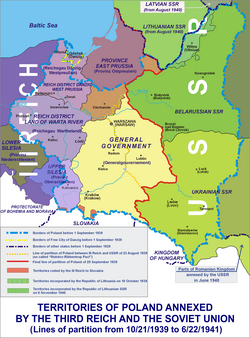
After Nazi Germany's invasion of Poland in 1939, the Wehrmacht, or German armed forces, recruited members from Poland's 2.2% ethnic-German minority, but did not enlist ethnic Poles on racist grounds. When Germany began losing the war in 1943, the Wehrmacht forcibly conscripted ethnic Poles, who were commanded with racist policies against them.[1]
Nazi Germany regarded Poland's ethnic-German minority as racially superior Volksdeutsche, and ethnic Poles as subhuman. In addition to murdering 3 million Polish Jews in the Shoah, Germany carried out genocide against the ethnic Poles; at least 1.9 million were murdered, especially those in influential and leadership roles, while the rest were exploited for their labour, including in the military.[2][1]
The Wehrmacht High Command did not trust the ethnic Poles under their command, who, when taken prisoner by the Allies, tended to enlist in the Polish Army in exile.[1] Nearly 90,000 Poles forcibly conscripted into the Wehrmacht subsequently fought against Nazi Germany in the Polish Armed Forces in the West. By Victory Day 1945, nearly a third of the Polish soldiers in the West had formerly served in the German military.[3] On the Eastern Front, prisoner-of-war camps for Wehrmacht soldiers were a substantial recruitment pool for the Polish Armed Forces in the East.[4]
The term "grandfather in the Wehrmacht" has become a slur in Poland.[1] Having served in the German military or being a descendant of such an individual has led in Poland to repression, discrimination, and ostracization. Even in the 21st century, such persons are often seen as not being an integral part of the Polish national community.[5]
- ^ a b c d A Polish heart in a feldgrau uniform – complicated journeys from the Wehrmacht to the Polish Army in Exile.
- ^ A Polish heart in a feldgrau uniform – complicated journeys from the Wehrmacht to the Polish Army in Exile
- ^ Kowalska, Magdalena (2015). "A Polish heart in a feldgrau uniform–complicated journeys from the Wehrmacht to the Polish Army in Exile" (PDF). Edukacja Humanistyczna. 2 (33).
- ^ M. Bennett; P. Latawski (November 30, 2004). Exile Armies. Springer. p. 36. ISBN 9780230522459.
- ^ Nijakowski, Lech M. (2009). "Discrimination Against Minorities in Poland on the Basis of History". International Journal of Sociology. 39 (3): 38–57. doi:10.2753/IJS0020-7659390302. S2CID 146137884.